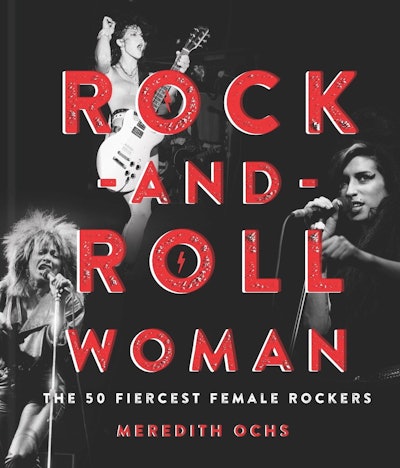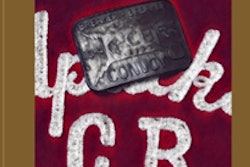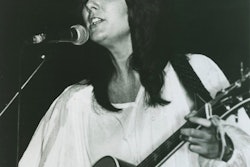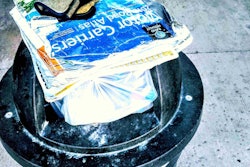OK, I admit it. I’ve been using this column and the platform Overdrive has given me to speak with some of the people I admire the most. Our next victim, whom I’m honored to have as a journalistic collaborator/source from time to time, is no exception. Gracie-award-winning radio personality, music columnist, and author, the “Highway Hellion” herself, Meredith Ochs, has been talking with me about her latest book, “Rock and Roll Woman: The 50 Fiercest Female Rockers.”
 Author, music journalist and former Freewheelin’ radio cohost Meredith Ochs
Author, music journalist and former Freewheelin’ radio cohost Meredith OchsMost in trucking might best know Ochs as cohost of the former Freewheelin’ program on Sirius XM’s Road Dog Trucking Radio channel, but her exhaustive knowledge of music stems from decades as both a broadcaster and writer in multiple genres. She brings an insider’s perspective into the lives of some of the most transformational female icons in the music world in the new book, while telling their frequently poignant stories with that depth and empathy that has come to be her calling card.
Here’s one of the book’s more haunting excerpts. Subject, Janis Joplin:
Death and legacy were on her mind in those final weeks. She co-paid for a headstone for Bessie Smith, the legendary blues and jazz singer she loved so madly that she liked to say that she was Smith reincarnated (Smith’s funeral had been held October 4, 1937 — the same month and day Joplin would die). She also updated her last will and testament on October 1, leaving $2,500 to throw her friends a party, “as a final gesture of appreciation and farewell to such friends and acquaintances.”

Three days later, Joplin overdosed on heroin, and was found on the floor of room 105 at the Landmark Hotel in Hollywood, between the bed and the nightstand, her face bloodied on her way to the ground, fresh track marks in her arm, and clutching $4.50 in her hand (apparently change from the cigarette machine). Her wildly painted Porsche was parked outside. Her friends got their party, at the Lion’s Share at San Anselmo. The Grateful Dead played. The invitations read, “Drinks are on Pearl” — one of Joplin’s nicknames.
 The book is available through Amazon and other online retailers and in select bookstores nationwide. Find more information via Ochs’ website.
The book is available through Amazon and other online retailers and in select bookstores nationwide. Find more information via Ochs’ website.Long Haul Paul: I found myself actually saddened at times by the skill and detail with which you evoked the resonance between the events of an artist’s life and the prevailing culture of the day. A couple of the more poignant early examples besides Janis Joplin are Big Mama Thornton being paid just $500 to record the first version of “Hound Dog,” as well as being ultimately consigned to a pauper’s grave. There was also the case of Marianne Faithfull bearing the brunt of public censure and personal turmoil for being found dressed in only a fur skin rug during a drug search at Mick Jagger’s home, while the Stones themselves emerged unscathed, if not lionized, by the incident. You’ve interviewed more than 1,000 people, most of whom made their living in some form of creative endeavor; in your opinion, are the sufferings of an artist distinct from those of the rest of us? In other words, we hear the artist must suffer, but some of your early examples — Tina Turner, Ronnie Spector — really had some horrible patches in their lives.
Meredith Ochs: Everybody suffers at some point — artists just have a more immediate outlet for theirs. Years ago I met Stephen King and he told me he never needed to go to therapy, because he turned his nightmares into books. I’d guess most people have opportunities to turn their bad experiences into something positive. There are a lot of stories like that in my book. Tina Turner and Ronnie Spector both left their abusive spouses and had phenomenal “second acts” — successful solo careers, happy marriages, good health. It doesn’t happen by accident, though. You have to work at it, and they did. The “prevailing culture” definitely hurt some of the women in the book, but they were in it for the long haul and they didn’t give up. Do you know how many record labels passed on Joan Jett’s “I Love Rock ‘n’ Roll?” All of them! So she formed her own label and put it out herself and it was a huge, enduring hit. That’s the kind of inspirational story I wanted to tell. You don’t have to be a musician to understand that kind of perseverance and apply it to your life.
LHP: After reading your account of the Runaways, I began researching Joan Jett. Yes, it took guts to do what she did. To me, though, it also shows her ability to create long-term stakeholders around her art. We’re talking the analogue era, here, where the production costs of one song could go five figures very easily. She was up against the hierarchical structure of the old music industry. Nobody but the band and the fans got that “I Love Rock ‘n’ Roll” was going to be a hit. So Jett and her partners gamble a lot of dough to see the song make it. There’s a great interview with Joan’s longtime producer, bandmate, and friend, Kenny Laguna, which was conducted by Jeb Wright several years ago. Laguna put the number of label rejections at 23. Jett was flat angry, as was Laguna and the whole band, because they knew they were right about the song. Laguna said it went number one in every market it played, not because they had a huge marketing budget, but because the fans got it. I found an endearing clip of Ms. Jett on Lettermam, well after “I Love Rock ‘n’ Roll,” where she tells Dave that any fan who takes the time to write her a letter and encloses their phone number can expect to get a call from her. So Lettermam reads an actual fan letter by a presumably young dude who is obviously smitten. Then they attempt to call the guy, right on the air. What made it so comedically brilliant was the surprise of Jett stepping down from the role of icon to someone calling a kid who sends her a love note. Fast forward to today, you have Mary Gauthier, who I will argue until the cows come home can rock with the best of them. I saw Mary perform a while back. She was in the crowd talking to friends up until the moment she is introduced, walking to the stage from where everyone else was. She wasn’t stepping down from the role of an icon. She was coming up from the crowd as a peer. Can you speak to the future of the rock icon in the wake of this peer-to-peer model? With the power of production now nearly commensurate with the power to consume through smart tools and digital home studios, will music become so democratized that there will never be another Tina Turner-type icon? Will approachability and relatability, such as Mary Gauthier’s or Alabama Shakes’ Brittany Howard’s, the former rural mail carrier whose life you chronicled, eventually overtake all that?
MO: A lot of these things are cyclical — that moment you describe with Mary Gauthier, that was also punk, it was grunge, maybe even country music to some extent: when you couldn’t tell the band from the fans until they got up and played. There will always be that kind of interaction, and on the flip side there will always be stars who are larger than life, whether they get famous via a record label or YouTube or American Idol or something no one has even thought of yet. The thing that can’t really be repeated is the music itself. There are contemporary bands playing iterations of classic rock and punk rock and other things, but all the social and historical factors that led up to those moments won’t happen in the same way again. That’s why I think it’s important to write about and to read about these artists. This music is part of American history… it is American history.
LHP: I’m glad you wrote it. One thing I have always enjoyed about you as a DJ is the way you enable the listener to hear the song with fresh ears. I can remember, as an example, listening to you spin Billy Joe Shaver’s “If You Don’t Love Jesus, Go to Hell,” and hearing you talk about Shaver’s knack for mixing the sacred and profane. Was part of your reason for writing this book a sense of obligation you felt toward the artists, many of whose innovations, such as Kathleen Hanna’s utilization of the fanzine (fan magazine), or zine, which would become a print precursor of the blog, have not been as widely documented as you felt they should have been? Were you hoping the reader to see these artists with fresh eyes?
MO: Yes and yes. Most of the women in the book are already famous, but I wanted to dig into some of the stories that have been overlooked or needed retelling in a contemporary context. Like the way Wanda Jackson challenged how country music looked and sounded. Or the years it took Chrissie Hynde to find her band and make that first Pretenders album, which is one of the most astonishing debuts of all time. Or how Bonnie Raitt, Grace Potter, and St. Vincent all have signature model guitars, and how St. Vincent designed everything about hers down to the circuitry. Or how Paramore’s Hayley Williams made Forbes magazine’s “30 under 30” last year for being a successful entrepreneur. They’re all musicians first and foremost, but they did so much more.
LHP: You mentioned having yet another book in the kitty. With one more book down, and another already written, it seems your hiatus from SiriusXM has thrown you into the creative briar patch, as it were. Did that event free you up as an author to delete some files from your folder that had been getting in the way? At the risk of conjuring a potentially unpleasant incident, can you speak to what that did for your own survivor’s mojo?
MO: It isn’t like that. I’ve had lots of overlapping radio and writing gigs for most of my adult life. They’re complementary skills. I wrote and published my first book a couple of years ago, around the same time that I was writing and recording my Gracie winning project for Sirius XM. Right now I’m working on a fourth book and an NPR series that will launch later in the year, in addition to doing a lot of radio and print interviews for “Rock and Roll Woman.” I’m also headed to the Women in Trucking Accelerate! Conference in Dallas to give a presentation based on the book, and I’ll be at SXSW in Austin in March to do something similar. The funny thing is that I’m busier now than I was when I had a day job. I just wanted a little time off, but that’s not going to happen any time soon.











